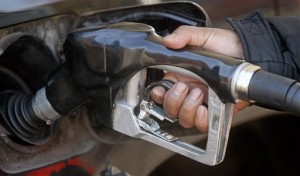
While Unioil Petroleum effected price rollbacks on Sunday, the other oil firms are cutting prices of petroleum products effective Monday, May 14, 2012. AP PHOTO/RICK BOWMER
MANILA, Philippines—Local oil companies have slashed prices of petroleum products starting Sunday to reflect the continued softening of prices in the international oil market.
Unioil Petroleum Philippines on Sunday rolled back prices of diesel by P1.65 a liter and of premium gasoline by P1.50 a liter.
Eastern Petroleum, meanwhile, is cutting prices of diesel by P1.70 a liter, premium gasoline by P1.60 a liter and of kerosene and regular gasoline by P1.50 a liter, effective Monday. The company said this rollback reflected one of the “biggest weekly movements in the international oil market, which appears to be stabilizing.”
Pilipinas Shell Petroleum Corp., Petron Corp., Chevron Philippines and Phoenix Petroleum Philippines are also rolling back prices of premium gasoline by P1.70 a liter, diesel by P1.60 a liter and of kerosene and regular gasoline by P1.50-P1.60 a liter, effective Monday.
Prior to this week’s rollback, prices of diesel ranged from P44.10 a liter to P48.10 a liter, while gasoline products retailed between P51.85 a liter and P59.37 a liter. As of May 8, the year-to-date net increase for diesel and gasoline stood at P1.54 a liter and P4.20 a liter, respectively.
According to a report from the Department of Energy (DoE), the decline in global oil prices can be partly attributed to “a bigger-than-expected rise in US crude oil stockpiles and reports of slowdown in American labor market, sparking fears of falling demand in the world’s top oil consumer.”
An indication made by the Organization of the Petroleum Exporting Countries (OPEC) that it wanted to scale prices down to sustainable levels was also bearing down on the market, the DoE report stated.
“Platts news quoted OPEC’s secretary general Abdullah El-Badri saying that the oil producers’ group was not happy with recent high oil prices of over $110 per barrel, as such levels could have a negative effect on world economic growth. Badri said US$100 per barrel was a comfortable price for both producers and consumers,” the DoE said.


